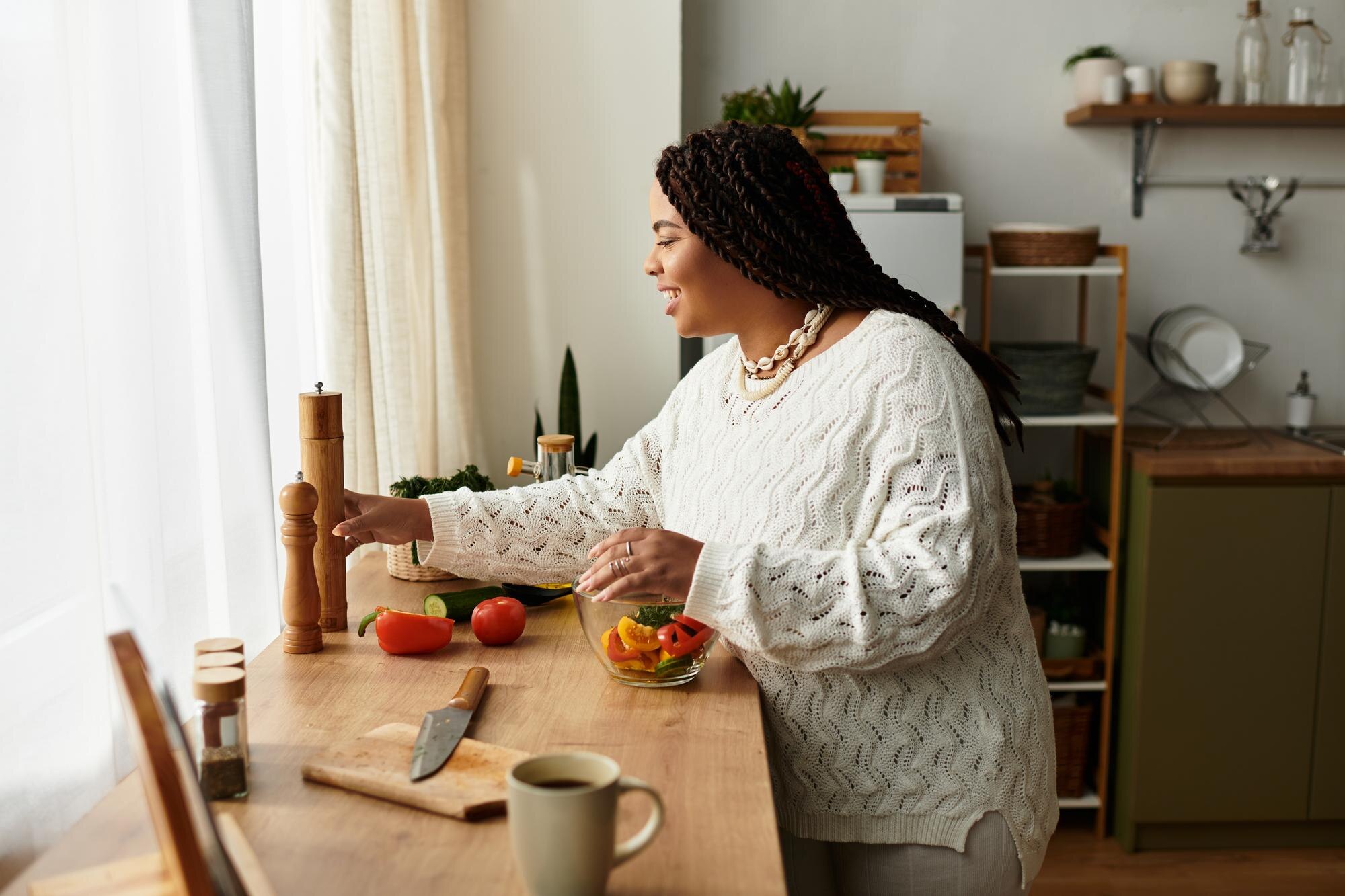
Young woman hiking on rocky beach in Spain, Benidorm. Watching the choppy sea and the bay. traveler enjoying freedom in serene nature landscape
Breaking the Cycle: How Emotional Clarity Leads to Freedom from Food Guilt
You know that sinking feeling after a binge? The guilt that hangs over you like a cloud? You’re not alone, and it doesn’t have to be this way. Emotional clarity could be the key you’ve been searching for to unlock freedom from food guilt. Imagine breaking free from those emotional chains and embracing self-worth without judgment. Ready for a change? Discover how VK Circle’s non-clinical coaching can guide you to a place of healing and peace. Learn more here.
Understanding Emotional Clarity

Emotional clarity plays a crucial role in our relationship with food. By identifying and understanding our emotions, we can better manage emotional eating habits. This section explores how emotions influence eating, how to identify emotional triggers, and ways to build emotional awareness.
The Role of Emotions in Eating
Emotional eating is when emotions, rather than hunger, drive food consumption. Stress, boredom, or sadness can lead to reaching for comfort foods. These emotions often mask true hunger signals, leading to overeating or binge eating.
Emotions and food often intertwine, serving as a temporary relief from discomfort. This connection can create a cycle where food becomes a coping mechanism. Recognizing emotional cues is the first step toward breaking this pattern.
Understanding the emotional roots of eating allows for more intentional decisions around food. By acknowledging these feelings, individuals can begin to address the underlying issues rather than using food as a temporary fix. For more on emotional eating, visit Helpguide.
Identifying Emotional Triggers
To overcome emotional eating, it’s essential to identify the triggers that lead to it. Triggers can be internal, such as feelings of loneliness, or external, like certain social situations. Recognizing these triggers can help in addressing them effectively.
Keep a food diary: Note what you eat and how you feel. This can reveal patterns between emotions and eating habits.
Reflect on emotional patterns: Consider what emotions commonly lead to binge eating or reaching for snacks.
Evaluate environmental influences: Notice if specific places or people make you more prone to emotional eating.
Identifying these triggers is the foundation for creating strategies to cope with emotions in healthier ways. Learn more about understanding triggers and emotional eating at the National Eating Disorders Association.
Building Emotional Awareness
Building emotional awareness involves becoming more attuned to your feelings and how they impact behaviors. It’s about recognizing emotions without judgment and understanding their influence on your eating habits.
Start by practicing mindfulness. This involves staying present and fully experiencing emotions without attempting to change or suppress them. Breathing exercises and meditation can enhance this awareness.
Regularly checking in with your feelings and labeling them can increase emotional clarity. This practice helps in distinguishing between emotional hunger and physical hunger, leading to more balanced eating habits. Emotional awareness is a powerful tool in breaking free from food guilt. For additional insights, check the Mayo Clinic guide.
Breaking Free from Food Guilt

Food guilt can weigh heavily on self-worth, creating a cycle of negative self-perception and emotional eating. This section delves into the impact of guilt, strategies for emotional freedom, and the benefits of non-clinical coaching.
The Impact of Guilt on Self-Worth
Guilt after eating can erode self-worth, leading to a harmful cycle of shame and emotional eating. When guilt becomes overwhelming, it can reinforce negative beliefs about oneself, making it harder to break free from binge eating patterns.
Food guilt often stems from societal pressures and unrealistic body standards. This constant comparison can leave individuals feeling inadequate and trapped in a cycle of eating and guilt.
Recognizing the impact of guilt is the first step toward healing. By shifting focus from guilt to self-compassion, individuals can start rebuilding their self-worth and separating their identity from their eating habits. To understand more about the relationship between guilt and eating disorders, visit Aster Springs.
Strategies for Emotional Freedom
Achieving emotional freedom involves adopting strategies that separate emotions from eating habits. By focusing on emotional clarity, individuals can develop healthier coping mechanisms.
Practice self-compassion: Treat yourself with kindness and understanding, especially after moments of emotional eating.
Set realistic goals: Aim for progress, not perfection. Small steps can lead to significant changes.
Seek support: Join support groups or find a coach who understands the nuances of emotional eating.
By implementing these strategies, individuals can start to regain control over their relationship with food, leading to a more balanced and fulfilling life. For more guidance on emotional freedom, consider exploring non-clinical coaching options like those offered by VK Circle.
Benefits of Non-Clinical Coaching
Non-clinical coaching provides a unique approach to tackling emotional eating. Unlike traditional therapy, it focuses on practical strategies and personal empowerment. By offering a supportive environment, it allows individuals to explore their emotions without fear of judgment.
Coaching benefits include:
Personalized strategies tailored to individual needs and challenges.
A focus on present and future goals rather than past issues.
Encouragement and accountability to keep individuals on track.
This approach can be especially effective for those seeking rapid, sustainable change in their relationship with food and emotions. VK Circle’s coaching program is designed to foster emotional freedom and self-worth, helping individuals break the cycle of food guilt. Learn more about how coaching can benefit you here.
Embracing a New Relationship with Food

Embracing a new relationship with food involves steps toward self-love, acceptance, and using tools offered by VK Circle. This section provides a roadmap to lasting change and healthier eating habits.
Steps Towards Self-Love and Acceptance
Developing self-love and acceptance is crucial for a healthy relationship with food. It involves recognizing your intrinsic worth and treating yourself with the kindness you deserve.
Affirm your worth: Regularly remind yourself of your value beyond your eating habits.
Celebrate small victories: Acknowledge progress in your journey toward emotional clarity and food freedom.
Surround yourself with positivity: Engage with supportive people who encourage self-worth and healthy habits.
These steps can significantly improve your self-image and reduce the reliance on food for emotional comfort. Embracing self-love leads to more mindful eating and a more joyful life.
Tools Offered by VK Circle
VK Circle offers tools designed to support emotional healing and foster a positive relationship with food. Their HYL360 Emotional Freedom Program focuses on non-clinical coaching and personal development.
Key tools include:
Guided exercises to enhance emotional clarity and self-awareness.
Personalized coaching sessions to address specific needs and challenges.
Community support to share experiences and advice with others on a similar path.
These tools empower individuals to take control of their eating habits and cultivate a healthier, more joyful relationship with food. By focusing on emotional clarity, VK Circle provides a path to personal growth and freedom from food guilt.
Your Path to Lasting Change 🌟
Embarking on the journey toward emotional clarity and freedom from food guilt requires commitment and support. VK Circle offers a pathway to lasting change, guiding individuals through a structured approach to emotional healing.
Here’s how you can start:
Schedule a consultation: Begin with a free consultation to discuss your needs and goals.
Join the program: Enroll in the 90-day HYL360 Emotional Freedom Program to receive personalized support.
Engage with the community: Connect with others who share your journey and offer encouragement.
By taking these steps, you can transform your relationship with food and discover a newfound sense of self-worth. Ready to break free from food guilt? Schedule a free consultation today and take the first step toward a healthier, happier life. 🌟



